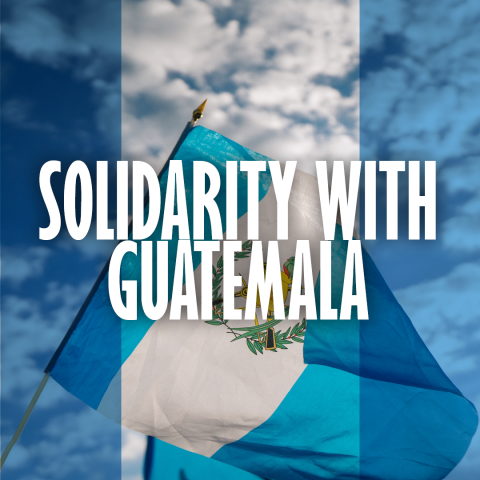
President-Elect Bernardo Arévalo is scheduled to take office on Jan. 14, but a peaceful transition of power is far from guaranteed. The following article was published in the January-February 2024 issue of NewsNotes.
It is safe to say that anti-corruption candidate Bernardo Arévalo’s success came as a surprise to the political establishment of Guatemala last year. Before June 25, he was one of eight presidential candidates and polling well-below the front-runners. Had he presented more of a threat before the runoffs, his candidacy might have been disqualified from the outset, as the Supreme Electoral Tribunal had done to three other candidacies. Instead, he came in a strong second place showing, and finished the Aug. 20 runoff election in a landslide victory, with nearly a 20% margin.
Not to be outdone, Guatemalan Attorney General Consuelo Porras’ office raided elections offices, seized ballots, and moved to outlaw President-Elect Bernardo Arévalo’s Semilla party in an effort to prevent the Jan. 14 inauguration, sparking massive Indigenous-led protests throughout the fall. Protesters and international observers accuse Porras and the current government of belonging to a “Pact of the Corrupt” alongside military, corporate, and organized crime leaders.
On Dec. 8, the Attorney General’s office called for election authorities to annul the election results. The international community responded swiftly, condemning what the European Parliament and others called an “attempted coup.” Protests took place at several Guatemalan embassies around the world. Twenty-eight international organizations from 11 countries signed a letter urging the government to respect the election results. The United States announced new sanctions against hundreds of Guatemalan officials and corrupt allies, reportedly for seeking to undermine democracy. And the Maryknoll Office for Global Concerns, with the Latin America Working Group and the Guatemalan Human Rights Coalition USA, released a letter of solidarity with Guatemalan protesters signed by over 30 organizations and 500 individuals. The electoral court refused Porras’ request.
At year’s end, Guatemalan Maryknoll Affiliate and human rights leader Claudia Samayoa writes: “The battle hasn’t been easy, but there will be a transition on 14 January, 2024. [We] know that on the 14th, a new, deeper struggle will begin to stop those forces who seek profit over the common good, and will attempt to stop the actions of the new government…
“In Guatemala’s journey over the past year, it has been instrumental that the international community has spoken with one voice, just as it had during the peace process. The governments of the USA, Latin America, and Europe were united: ‘Respect the elections. Respect the will of the people.’ … The Guatemalan solidarity movement in the United States should feel it has played a part in what we have accomplished. We thank them, and we will continue to work together for democracy.”
Graphic with image of Guatemala flag by Shalom Leon via Unsplash.
